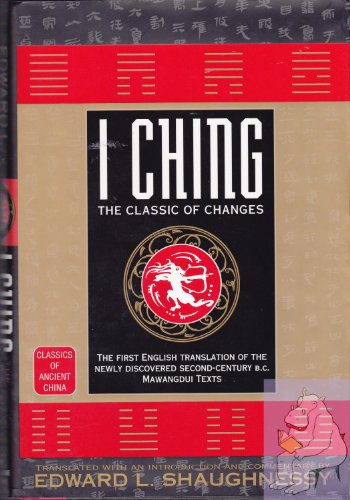I Ching (Classics of Ancient China)
Shaughnessy, Edward L.
About the Book
Description:
Used. Seller Inventory # GoodWizard0345362438
About this title:
Synopsis: For more than two thousand years, the oracular, enigmatic pronouncements of the I Ching (Classic of Changes) have intrigued and inspired readers. In the West, scholars have long regarded the volume as one of the seminal texts of Chinese culture, comparable to the Bible or the Upanishads, and readers everywhere have turned to the hexagrams, line statements, and commentaries for guidance on every imaginable life situation.
Given the enduring importance of this work, it was a momentous event when a significantly different I Ching text was unearthed in Mawangdui, China, in 1973--the first new manuscript of the work to appear in two thousand years. Now translated into English for the first time by one of West's leading scholars of the I Ching, the Mawangdui text brings welcome clarity, accessibility, and novelty to this beloved classic.
Like the received version, the Mawangdui I Ching and its commentaries begin with a central core of sixty-four hexagrams, but in an important departure, the hexagrams in the newly discovered text are arranged in a systematic and logical way and, in many cases, are assigned different names. The line statements that accompany the hexagrams frequently differ from the received text. In addition, the Mawangdui version contains five new commentaries that had been lost for more than two thousand years, including the surprising discovery of a commentary that quotes Confucius extensively on how he had come to change his earlier, negative, views about the importance of the I Ching.
The new material, the logical arrangement of the hexagrams, the more Taoist tone of the "Appended Judgments", the illuminating introduction and notes by Edward L. Shaughnessy and, above all, the lucid purity of his translation, make the Mawangdui I Ching a treasure. Readers who wish to use the hexagrams for divination will find this version more intriguing than even the previous text; scholars will derive new insights from the Mawangdui commentaries and from the "Appended Judgments," one of the most sophisticated and subtle essays in all of Chinese philosophy; admirers of world literature will cherish this volume as a work of timeless artistry.
Review: What are the most widely read and commented upon works in history? The Bible? The Vedas? The Quran? How about the I Ching? Every major thinker in Chinese history has had something to say about it. Passed down from generation to generation, it has been admired, studied, and put into practice. In 1973, archaeologists unearthed a number of silk manuscripts dating back to 168 B.C. Included in the find was a version of the I Ching and four commentaries previously lost. The text itself differed in places from the accepted version, especially in the arrangement of the hexagrams. Scholar Edward Shaughnessy has translated the entire text, along with the four commentaries and an additional commentary (the Appended Statements) that traditionally accompanies the text. The newly discovered commentaries offer a variety of interesting opinions, one of which appears to be Taoist, while another has Confucius explaining what the I Ching means to him. Shaughnessy includes the Chinese text of both the received version and the excavated version, although, unfortunately, the notes are buried in the back, making it difficult to follow the subtle differences. --Brian Bruya
Bibliographic Details
Title: I Ching (Classics of Ancient China)
Publisher: Ballantine Books
Publication Date: 1997
Binding: Hardcover
Condition: very good
